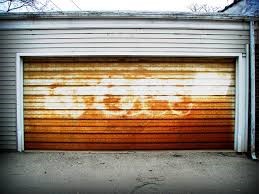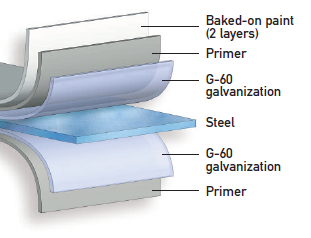Remember that promise of high-quality rust protection when you installed your new garage door? Well, as it turns out, that might not actually keep rust from finding its way into or onto your door.
Before you can figure out a solution, you have to know the cause. This is easy to do if you just look around at your environment and understand what might be to blame. Plus, this information will help you become proactive about garage door rust. For every metal garage door, regular washing can go a long way. Here are some other things to consider.

Look around
Take a minute to think about where you live. People who live by the water, for example, are more likely to experience issues with moisture and rust in and around their home. Those who live near saltwater face the risk of even more damage from the added salt. Other environmental causes to consider include:
- Homes near industrial areas with outdoor raw material storage
- Garages near the street where excess salt is used for de-icing during winter months
These might sound likely they’re unlikely situations, but they are some of the most common reasons for customer complaints regarding newer doors that are showing signs of rust or other damage. Garage door specialists will often inquire about these and other potential environmental or situational causes when attempting to diagnose the issue.
One harmless cause for concern, for some homeowners, could be that yellow/orange coating of pollen that is found in the spring. When pollen from yellow and white birch trees ends up on garage doors, it can easily be mistaken for rust.
The painting process matters
Another important aspect of the rust resistance of any door is how it is painted and what materials are used. In the U.S., most manufacturers use a process that involves a single coat of primer and then a multi-stage 2-layer coat of paint that is baked on. The Association of North American Garage Door Manufacturers also has strict guidelines requiring a coating of zinc to galvanize and protect the steel from rust. Think of your garage door in layers, as pictured. The steel is in the middle, which gives it the best protection from rust.

If you did not purchase the garage door that came with your garage, you need to know whether it was previously repainted by the former homeowner or a professional company. If it was done by professionals, you should attempt to find out their application process and the materials that were used.
Keep in mind that if your garage door surface has been damaged, it may have cracked the paint or even punctured the steel of the door itself. In this case, the extra galvanization and protective coating are useless because they have likely been removed from the damaged area. Think of it like the doors on a car-- if the door panel is damaged in a way that chips the paint, you have to properly repair and repaint the door to prevent rust damage from forming on the exposed surfaces.
When is the last time you washed your garage door?
Some people have never even thought to wash their garage door, let alone actually done the task. If you think about it, though, plenty of dirt and grime are going to build up on the door over time. This could be from the outside elements, work you do in the garage, or even the regular operation of the door opener. Check for oil spots while you’re washing, because this could be a sign that your drive chain was over-lubricated or you used the wrong lubrication (white grease is to be used, and only as needed).
You can use regular soap and water to wash your door, or whatever soap you use to wash your car. Dish detergent works well since it usually has a degreasing agent in it. Don’t worry about high pressure-- in fact, you should never use a pressure washer to wash your door. Your regular hose with a moderate shower or spray setting should suffice. High-pressure sprayers could actually damage the paint surface.
What if there is rust?
For the most part, the rust spots you notice on your garage door are probably going to be small dots or specks that almost appear stuck to the door from another source. Especially on the lower part of the door, this is common for doors that are close to a street and experience a lot of exposure to snow, ice, and salt used to remove them.
With surface stains, removal is quite simple. Use a mild product to start, such as a mixture of vinegar and water (50/50). This can simply be sprayed on the door and then wiped off with a cloth or towel. If it doesn’t do the trick, you might need something a little stronger. For stubborn rust, a mixture of baking soda and water can be used like a paste. Apply the paste mixture to the rust areas and allow to dry. After 20 to 30 minutes, use a cloth to remove the paste and rinse the area with water.
For stubborn rust, you can even try using a bathroom tile cleaner. Just allow the product to sit for the recommended time after spraying and then wipe the door and rinse it with water to remove any residue.
Regular washing is a must
At the very least, you should wash your garage door at least twice per year. People who live in areas with higher pollution or other environmental factors may need to wash their garage door more often. In the spring, you can wash all of the winter grime off of the door. Wash it again in the fall to remove the spring and summer buildup and give it a clean start for the upcoming winter. You can save time and trouble by washing your car at the same time. And like your car, your garage door can be protected with liquid wax to maintain its shine.
Check out our Garaga’s maintenance guide to keep your door in great shape. It might require a little extra effort, but the results will be worth it.
If rust has led to replacement…
If your garage door is just beyond repair and you live in the greater Ottawa area, you can contact us now at 613-749-2138 to discuss your options and learn about all of the great custom solutions for garage door replacement.

Add new comment